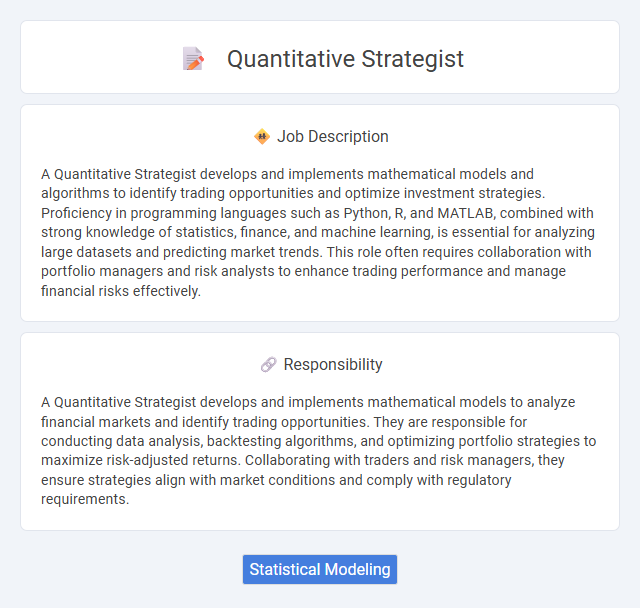
A Quantitative Strategist develops and implements mathematical models and algorithms to identify trading opportunities and optimize investment strategies. Proficiency in programming languages such as Python, R, and MATLAB, combined with strong knowledge of statistics, finance, and machine learning, is essential for analyzing large datasets and predicting market trends. This role often requires collaboration with portfolio managers and risk analysts to enhance trading performance and manage financial risks effectively.
Individuals with strong analytical skills, proficiency in mathematics and programming, and a keen interest in financial markets are likely suitable candidates for a quantitative strategist role. Those who thrive in high-pressure environments, enjoy solving complex problems using data-driven models, and have the ability to adapt quickly to market changes may find this career particularly fitting. Conversely, individuals who prefer routine tasks or lack comfort with uncertainty might face challenges excelling in this dynamic position.
Qualification
A Quantitative Strategist typically holds advanced degrees in mathematics, statistics, computer science, or financial engineering, with strong proficiency in programming languages like Python, R, or C++. Expertise in statistical analysis, financial modeling, and machine learning techniques is essential for developing data-driven trading strategies. Experience with large datasets, algorithmic trading platforms, and risk management principles enhances effectiveness in this role.
Responsibility
A Quantitative Strategist develops and implements mathematical models to analyze financial markets and identify trading opportunities. They are responsible for conducting data analysis, backtesting algorithms, and optimizing portfolio strategies to maximize risk-adjusted returns. Collaborating with traders and risk managers, they ensure strategies align with market conditions and comply with regulatory requirements.
Benefit
A Quantitative Strategist likely offers significant benefits such as enhanced decision-making powered by advanced data analytics and modeling techniques. This role could provide strong opportunities for financial growth and career advancement in quantitative finance fields. Employers may value the strategist's ability to improve trading strategies, potentially increasing profitability and managing risks effectively.
Challenge
A quantitative strategist role likely involves complex data analysis and model development to optimize trading strategies, presenting significant intellectual challenges. The position may require adapting to rapidly changing market conditions and integrating vast datasets, which could test problem-solving skills. The challenge might also include balancing risk management while striving for consistent returns in a highly competitive environment.
Career Advancement
Quantitative strategists leverage advanced mathematical models and data analysis to drive investment decisions and optimize trading strategies. Career advancement often involves progressing from junior analyst roles to senior strategist positions, with opportunities to lead teams or manage portfolios at hedge funds, investment banks, and asset management firms. Mastery of programming languages, financial theory, and machine learning techniques significantly enhances prospects for promotion and high-impact roles within quantitative finance.
Key Terms
Statistical Modeling
Quantitative strategists specializing in statistical modeling leverage advanced mathematical techniques to analyze financial data and predict market trends. They develop and implement algorithms using statistical methods such as regression analysis, time series forecasting, and machine learning to optimize trading strategies. Expertise in programming languages like Python, R, and MATLAB is essential for building robust predictive models that drive investment decisions.
 kuljobs.com
kuljobs.com